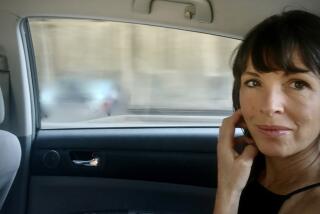âA Village Life: Poemsâ by Louise Gluck
A Village Life
Poems
Louise GlĂźck
Farrar, Straus and Giroux: 72 pp., $23
When I tell you that Louise GlĂźckâs âA Village Lifeâ is a book of poems set in a quietly dying agricultural community, probably in Italy, probably some time between the 1950s and today, and that its plots -- for it works very much like a collection of linked short stories -- revolve around sexual awakening, farm work and old men gossiping in cafes, you will no doubt think: wistful, polite, conservative, the poetic equivalent of a landscape done in watercolor. But that would be dead wrong, as a poem titled âPastoralâ makes clear. Though it opens with an image, gentle enough, of the sun coming up over a mountain on a misty morning, âPastoralâ swiftly turns severe: âThe sun burns its way through, / like the mind defeating stupidity.â Then, as the meadow we expect from the title is revealed, the speaker of the poem declares, âNo one really understands / the savagery of this place, / the way it kills people for no reason, / just to keep in practice.â
Not many poets can be electrifying while keeping the stakes this hypothermically low. GlĂźck is a master, finely calibrating the shocks and their intervals. This collection, her 11th, is frightening the way a living statue would be frightening if it were to smile at you.
GlĂźck camouflages herself in language so plain itâs almost banal; then she shows her teeth. In âBefore the Storm,â she writes of an escaped sheep, âand not just any sheep -- the ram, the whole future. / If we see him again, weâll see his bones.â The village youth are leaving too. âMidsummer,â a long-lined poem about teenagers night-swimming in a quarry -- âmarble for graveyards, / for buildings that we never sawâ -- explores the excruciating ambiguity of adolescence, the thrill of incipient maturity and the relief of being able to retreat to childhood. The poemâs message, communicated in its final strophe, is that some things are inescapable:
And for those who understood such things, the stars were sending messages:
You will leave the village where you were born
and in another country youâll become very rich, very powerful,
but always you will mourn something you left behind, even though you
canât say what it was,
and eventually you will return to seek it.
Ordinariness is part of the risk of these poems; in them, GlĂźck hazards, and dodges, sentimentality. The near miss makes us shiver.
It is typical of GlĂźck -- whose exquisite 1992 book âThe Wild Irisâ was composed mostly of dramatic monologues delivered by the flowers and weeds in a Northeastern garden -- that she has created a coherent world here, with loosely connected characters operating in a discrete physical environment.
The primary mise-en-scène of âA Village Lifeâ takes place around a fountain, described in the poem âTributariesâ as the orienting point where â[a]ll the roads in the village unite.â The fountain is a potent symbol for creativity, renewal and even, as GlĂźckâs choice of verb suggests, the center of the universe. It is a setting brimming with received meaning. Her deflating, laconic wit sets to work on this almost at once. âThe fountain rises at the center of the plaza,â she writes; âon sunny days, rainbows in the piss of the cherub.â
The movement of the poem, centripetal at first, turns centrifugal. Closest to the water are couples, staring at their reflections; then mothers with young children. (âThe children cry, they sometimes fight over toys. / But the waterâs there, to remind the mothers that they love these children; / that for them to drown would be terrible.â) Beyond them, at metal tables, drinking cognac or coffee, smoking cigarettes, sit the old men. By the time âTributariesâ ends, the fountain has transformed from an image of life-sustaining power to one of denial. âThe first leaves of autumn litter the fountain,â GlĂźck observes. âThe roads donât gather here anymore; / the fountain sends them away, back into the hills they came from.â
It is time, I suppose, to talk about death. The energies of these poems are of dissipation and withdrawal. In GlĂźckâs world, sleep is a rehearsal for death and the couplings of teenagers in the woods merely foreshadow the bodyâs later, lonelier, nude encounter with the dirt. Shadows themselves become newly ominous. The speaker of the title poem brokenly invokes
The death and uncertainty that await me
as they await all men, the shadows evaluating me
because it can take time to destroy a human being,
the element of suspense
needs to be preserved --
Into this realm, GlĂźck introduces a persona as imperious as any of Miltonâs angels, an earthworm who addresses humanity (preposterously, deliberately) as âMortal,â while lecturing that ânot all pity / descends from higher to lesser, some / arises out of the earth itself.â
According to the earthworm, humans -- afraid of death, of entering the earth -- are âmutilated at the core, your mind / detached from your feelings,â whereas ârepression does not deceive / organisms like ourselves.â Succumb, the worm says, and fear will subside. The menace is so quiet, so very matter-of-fact: âdeath will come to seem a web of channels or tunnels like / a spongeâs or honeycombâs, which, as part of us, / you will be free to explore.â As part of us: If this worm had teeth, they would be glinting.
Goodyear is a staff writer at the New Yorker. She is the author of the poetry collection âHoney and Junk.â
More to Read
The biggest entertainment stories
Get our big stories about Hollywood, film, television, music, arts, culture and more right in your inbox as soon as they publish.
You may occasionally receive promotional content from the Los Angeles Times.










